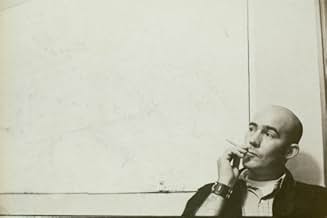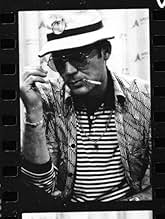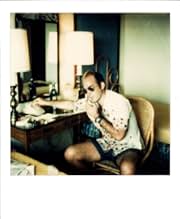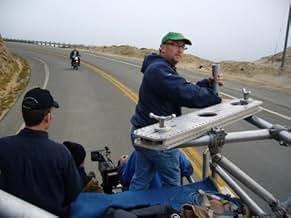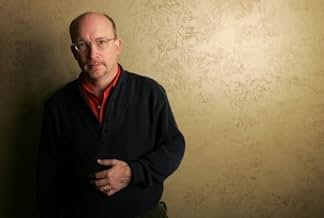Gonzo: Vida y hazañas del Dr. Hunter S. Thompson
Título original: Gonzo: The Life and Work of Dr. Hunter S. Thompson
PUNTUACIÓN EN IMDb
7,6/10
8,6 mil
TU PUNTUACIÓN
Añade un argumento en tu idiomaA portrait of the late gonzo journalist Hunter S. Thompson.A portrait of the late gonzo journalist Hunter S. Thompson.A portrait of the late gonzo journalist Hunter S. Thompson.
- Premios
- 1 premio y 5 nominaciones en total
Hunter S. Thompson
- Self
- (metraje de archivo)
Oscar Acosta
- Self
- (metraje de archivo)
Muhammad Ali
- Self
- (metraje de archivo)
Warren Beatty
- Self
- (metraje de archivo)
Argumento
¿Sabías que...?
- CuriosidadesAt 1:35 you can see a Richard Nixon mask under the TV. This is a nod to the 1980 movie "Where The Buffalo Roam" starring Bill Murray as Thompson, where he uses that mask to train his dog to attack a scarecrow-like recreation of the former President.
- PifiasWhen the film mentions that Hunter Thompson had a crush on Jefferson Airplane singer Grace Slick, archival footage instead shows the Airplane's first female singer, Signe Anderson.
- ConexionesFeatures To Tell the Truth (1956)
Reseña destacada
In the sphere of all the memoirs collected in this post-counter culture portrait of a counter culture icon, narrated by Johnny Depp who played him to some extent in Terry Gilliam's film version of Fear and Loathing In Las Vegas, there was one issue I found noticeably absent: The reality of the unhappiness and suffering of this comic book character of a painfully vague crustacean. The film finds remarkable approach to the people involved in his life, but not even from his two wives do we get a picture of what he was like the inevitable physiological drawbacks caught up with him. He was plainly, intensely addicted to drugs and alcohol, and after a trance-like sleep not much different than passing out at the right time, he would have awakened in a mess of depression and alienation. What did he say on those mornings and afternoons? How did he act?
Of course, it is said during the film that he would drink all day or take drugs and there was no discernible effect. I don't think I buy that. What if it was a front? The main thing is, he wasn't killed by day-to-day simultaneous intakes of alcohol and pills, which can really tear up your head, which are said to cause a likelihood of seizures. He was killed by himself, which he himself scripted and all of his friends totally assumed would happen. He took every reckless risk there was to take, and he, not time or drugs or people, ended it all because his own agenda was dried out. As a journalist, for instance, he reported that at some point in a presidential primary Edward Muskie consumed Ibogaine, a psychoactive drug given out by a "mysterious Brazilian doctor," information which was entirely fictitious yet was actually learned and passed along as truth. Thompson's stunt may have been part of the cause of Muskie's furious irritability throughout the 1972 Florida primary. No other journalist could have carried such a fib, but Thompson was fortified by his myth that he could publish anything.
He was an unpredictable, nearly spellbinding writer, with a savage hilarity in his style. He was never aware of impartiality. In 1972 he backed George McGovern as the Democratic nominee, and no slander was too degraded for him to attach to McGovern's rivals in either party.
This documentary by Alex Gibney is notable, to begin with, for recapitulating to us through how many fires Thompson ran of his very own volition. He rode with the Hells' Angels for a year. Ran for sheriff and lost, but came in very close. Covered the 1972 and 1976 presidential primaries, and had an inexplicable personality, so that for instance McGovern, Tom Wolfe and his wives and son think of him lovingly, but also as enormously cruel and spiteful.
Nobody in the film was around while he was doing things that initially fortified him within the sphere of legend. He became celebrated for writing about that edge of speed going around a bend which you could never pass without killing yourself. He rode loads of edges on his motorcycle, and never got killed. He said persistently that the way he chose to go was by doing the job himself, with a gun, before his success declined. He died that way, using one of his 22 firearms, but he had most definitely declined by that time.
Without doubt he made an impact on his generation like not many other journalists ever have. This documentary is all you could wish for about the man's career and involvement with different people, but there is something at his core that we are inhibited from fully understanding for sure. And it results in you speculating on how so many people liked him when he didn't even seem to have liked himself?
Of course, it is said during the film that he would drink all day or take drugs and there was no discernible effect. I don't think I buy that. What if it was a front? The main thing is, he wasn't killed by day-to-day simultaneous intakes of alcohol and pills, which can really tear up your head, which are said to cause a likelihood of seizures. He was killed by himself, which he himself scripted and all of his friends totally assumed would happen. He took every reckless risk there was to take, and he, not time or drugs or people, ended it all because his own agenda was dried out. As a journalist, for instance, he reported that at some point in a presidential primary Edward Muskie consumed Ibogaine, a psychoactive drug given out by a "mysterious Brazilian doctor," information which was entirely fictitious yet was actually learned and passed along as truth. Thompson's stunt may have been part of the cause of Muskie's furious irritability throughout the 1972 Florida primary. No other journalist could have carried such a fib, but Thompson was fortified by his myth that he could publish anything.
He was an unpredictable, nearly spellbinding writer, with a savage hilarity in his style. He was never aware of impartiality. In 1972 he backed George McGovern as the Democratic nominee, and no slander was too degraded for him to attach to McGovern's rivals in either party.
This documentary by Alex Gibney is notable, to begin with, for recapitulating to us through how many fires Thompson ran of his very own volition. He rode with the Hells' Angels for a year. Ran for sheriff and lost, but came in very close. Covered the 1972 and 1976 presidential primaries, and had an inexplicable personality, so that for instance McGovern, Tom Wolfe and his wives and son think of him lovingly, but also as enormously cruel and spiteful.
Nobody in the film was around while he was doing things that initially fortified him within the sphere of legend. He became celebrated for writing about that edge of speed going around a bend which you could never pass without killing yourself. He rode loads of edges on his motorcycle, and never got killed. He said persistently that the way he chose to go was by doing the job himself, with a gun, before his success declined. He died that way, using one of his 22 firearms, but he had most definitely declined by that time.
Without doubt he made an impact on his generation like not many other journalists ever have. This documentary is all you could wish for about the man's career and involvement with different people, but there is something at his core that we are inhibited from fully understanding for sure. And it results in you speculating on how so many people liked him when he didn't even seem to have liked himself?
- jzappa
- 5 oct 2008
- Enlace permanente
Selecciones populares
Inicia sesión para calificar y añadir a tu lista para recibir recomendaciones personalizadas
- How long is Gonzo?Con tecnología de Alexa
Detalles
Taquilla
- Recaudación en Estados Unidos y Canadá
- 1.252.100 US$
- Fin de semana de estreno en EE. UU. y Canadá
- 191.942 US$
- 6 jul 2008
- Recaudación en todo el mundo
- 1.491.958 US$
- Duración2 horas
- Color
- Mezcla de sonido
- Relación de aspecto
- 1.85 : 1
Contribuir a esta página
Sugerir un cambio o añadir el contenido que falta

Principal laguna de datos
By what name was Gonzo: Vida y hazañas del Dr. Hunter S. Thompson (2008) officially released in India in English?
Responde


